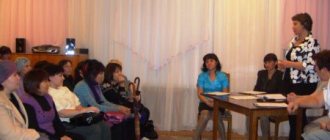Psychological readiness of children for school. Parent meeting.
Parent meeting on the topic:
“Psychological readiness of children for school”
Teacher: Barabanova E.Ya.
Hello dear parents!
A few more months will pass and your child will go to school. Many of you are worried and worried about your child’s school life. And now I would like to conduct a survey with you - the “Basket of Feelings” game.
Instructions: “Dear moms and dads! I have a basket in my hands. You have to briefly formulate the feelings and emotions that overwhelm you as you look forward to your child’s school life. Let these be a variety of feelings: both positive and negative.”
Also, many of you are concerned about the question: How to prepare your child for school. Many parents believe that a child should be able to count, read, and write by school. And he's ready for school.
1.
This is of course important, but the child must be psychologically ready for school.
Let's look at what psychological readiness is. (Ask your parents?)
2. Psychological readiness
school readiness includes several components: intellectual readiness, motivational, volitional and social, physical.
3. Intellectual readiness.
It assumes a certain level of development of the child’s thinking, speech, attention, memory, perception and fine motor skills.
4.
In kindergarten, a child’s leading activity is play. Various games are useful (didactic, active, role-playing, construction games). It is especially valuable when several children participate in such games at once.
This develops collectivism, the child learns to build
relationships, resolve conflicts.
Children master adult life, a system of behavior,
responsibilities. And most importantly, everything happens without coercion, easily and willingly.
During games, thinking, memory, imagination, attention, and perseverance develop. We solve logical thinking problems, puzzles, and crosswords with our children. We develop fine motor skills through various games “Collect beads”, “Cinderella” and so on; Also in the kindergarten, finger gymnastics are held.
5.
By the age of 6–7 years, a child should know:
his address and the name of the city in which he lives;
name of the country and its capital;
names and patronymics of their parents, information about their places of work;
seasons, their sequence and main features; names of months, days of the week;
main types of trees and flowers.
he should be able to distinguish between domestic and wild animals.
Know the composition of numbers up to 10, count up to 20. Use ordinal and quantitative counting. Compose and solve problems.
Orientate yourself in the surrounding space and on the plane of the sheet.
Compose stories according to plan and sample. Name words in a sentence, sounds and syllables in words sequentially. Finding words with a given sound in a sentence determines the place of the sound in the word.
In our kindergarten, for many years we have been teaching children to do sound analysis of words. Since the curriculum at school is complex. Of course, we take simple words. For example: the word CAT
,
Fox
. (In the word cat, the first sound K is a hard consonant, denoted in blue; the second sound O is a vowel, denoted in red; the last sound T is a hard consonant, denoted in blue. In the word CAT there are three sounds, one syllable). Fox (In the word fox, the first sound L is a soft consonant, denoted in green; the second sound I is a vowel, denoted in red; the third sound C is a hard consonant, denoted in blue; the last sound A is a vowel, denoted in red. In the word fox - four sounds, two syllables.)
In other words, he must navigate time, space and his immediate environment.
6.
Motivational
readiness.
It implies that the child has a desire to accept a new social role - the role of a schoolchild.
To this end, parents need to explain to their child that children go to study to gain knowledge that is necessary for every person.
You should give your child only positive information about school. The child should see that his parents are calm and confident about his upcoming entry into school.
The reason for the reluctance to go to school may be that the child “hasn’t played enough.” But at the age of 6–7 years, mental development is very plastic, and children who “haven’t played enough” when they come to class soon begin to experience pleasure from the learning process.
7.
Willful readiness.
suggests that the child has:
ability to set goals
make a decision to start activities,
outline an action plan,
complete it with some effort,
evaluate the results of your activities, as well as your ability to perform unattractive work for a long time.
The development of strong-willed readiness for school is facilitated by visual activity and design.
8. Social readiness.
This is the ability to communicate with children and adults. Low social readiness is often found in children who have not attended kindergarten, and can lead to quite serious stress and problems with learning. For example, it happens that a child is accustomed to having all the adult’s attention directed at him, as was the case in the family. There are twenty of the same children in the class. Inability to communicate with peers can lead to difficulty participating in group work in class.
A shy child may be negatively affected by being around a lot of new people if he is not used to it. The result is fear of answering in class, inability to ask the teacher for help, and a variety of other difficulties.
9. Physical readiness.
It is very important that the child has health and high performance. Children with high performance demonstrate greater persistence and concentration, which allows them to efficiently and effectively cope with the amount of work in accordance with the educational material.
By the time a child enters school, the ability to withstand static loads must be developed and the ability to independently and creatively use the accumulated arsenal of motor means must be developed. Motor activity should become a natural need for almost every child, regardless of the level of his individual motor activity.
The child must have developed agility, speed, coordination, orientation, and endurance.
(A brief analysis of parenting experiences. Basket of feelings).
Basically these are exciting feelings, feelings of anxiety.
Parent meeting “Psychological readiness of the child to study at school”
Moderator:A child’s admission to school sums up his preschool childhood and changes the social situation of his development. And for parents, the last year before their child enters school brings a lot of anxiety and excitement. For example, some mothers and fathers are trying to study the first grade program with their son or daughter. However, there is absolutely no point in doing this. It is better to make sure that the child has sufficient psychological maturity to study at school.
When they talk about “psychological readiness for school,” they do not mean individual skills and knowledge, but a specific set of them, in which all the main components are present.
School maturity includes several main components that complement each other:
- physiological readiness,
- intellectual preparation,
- emotional-volitional maturity,
- social and personal readiness.
We will talk about these components now.
1.Physiological readiness
includes the child’s health status, his physical development, and the development of gross and fine motor skills.
FINE MOTOR SKILLS.
By the age of seven, hand-eye coordination and finger dexterity should be well developed.
2. In terms of intellectual readiness
The child must have well-developed processes such as attention, memory, perception, thinking, imagination and speech.
3.Emotional-volitional readiness for school
An equally important condition for a successful start to school life is the ability to live in a team and take into account the interests of the people around you.
4. Social and personal readiness
- Ability to communicate with adults and peers
- The ability to work in a group, to feel like a member of a group, a group community (class).
- The ability to subordinate one’s behavior to the laws of children’s groups and the norms of behavior established in the classroom and school. Be disciplined.
- Ability to constructively resolve conflict situations
- Self-confidence and self-confidence, independence, initiative.
- The ability to correctly evaluate yourself and your behavior
- Ability to be independent, active and proactive.
By school age, children come with a different amount of experience - abilities, knowledge, skills, habits. Subsequently, each of them will learn to read and count and become literate, but for learning to be successful, by the time they enter school it is important to have the ability to perceive and assimilate new material, i.e. "ability to learn."


